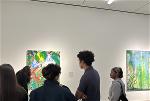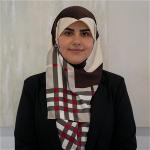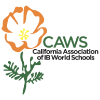By Brent Davis and Mohammed A. Masnadi-Shirazi, PhD
AURA’s education seeks to develop learners who understand the world, who understand people, and who have a relationship with God. If you want to understand the world, you need to know physics. Consequently, physics is one of the core courses at AURA. Consistent with the IB inquiry-based education model, physics is more learner-driven at AURA. To understand this course better we asked Dr. Masnadi-Shirazi, the physics teacher, some questions about physics and the AURA course in particular:

Why is physics fundamental for other science classes including health science?
Physics is fundamental to other sciences, including health sciences, because it provides the foundational principles and concepts that explain how the natural world operates. These principles often underpin the mechanisms studied in other scientific fields. Here's how physics contributes:
Understanding Fundamental Laws of Nature
Medical Technology
Circulation and Fluid Dynamics
Energy Transfer and Metabolism
Foundation for Chemistry and Biology
Problem-Solving and Analytical Skills
In summary, physics serves as a bedrock for understanding the mechanisms behind natural and biological phenomena, making it indispensable for health sciences and other scientific disciplines.

What sparked your interest in physics?
My "interest" in physics comes from its ability to explain how the universe works, from the tiniest particles to the vastness of galaxies. Physics offers a logical framework for understanding energy, matter, and the fundamental forces that govern our world.
Can Physics Teach Us Anything About God?
The relationship between physics and the concept of God is a topic of philosophical and theological inquiry. Physics doesn't explicitly address metaphysical questions but offers insights that some interpret as relevant to understanding divine attributes or existence.

The Fine-Tuning Argument:
The Big Bang and Creation:

Limits of Physics: Physics provides tools for understanding the physical universe but does not address questions of purpose, meaning, or ultimate causation. These questions lie within philosophy, theology, and personal belief.
Physics doesn't prove or disprove God but offers a lens to contemplate existence, complementing spiritual or theological reflections.
How Do You Collaborate with the Music Class and Achieve IB Educational Distinctives?
Collaborating with the music class blends physics with creative arts, fostering interdisciplinary learning—a key feature of the International Baccalaureate (IB) framework.

Focus on the Physics of Sound and Music:
Investigate Cultural Perspectives on Sound and Music:
Highlight Connections to Theory of Knowledge (TOK):
IB Educational Distinctives in Action:

Content Differentiation:
Process Differentiation:
Product Differentiation:
Interest-Based Grouping:
Inclusivity through Cultural Contexts:
Distinctive IB Approaches:


What would you like prospective students and parents to know about the physics class?
In the physics class, students can expect an engaging exploration of the physical world through hands-on experiments, problem-solving, and real-world applications. We focus on building a strong foundation in key physics concepts, such as mechanics, electricity, magnetism, and waves, with an emphasis on critical thinking and curiosity-driven learning. Our goal is to foster not just an understanding of physics, but a genuine excitement about how the laws of nature shape the world around us.
The collaboration with the music class offers a unique opportunity to see how physics and music intersect. Students will explore sound waves, acoustics, and the physics behind musical instruments. They'll have the chance to experiment with frequency, pitch, resonance, and more, gaining a deeper appreciation for both the science and art of music. This cross-disciplinary approach encourages creativity, teamwork, and a more holistic understanding of both subjects, making the learning experience not only educational but also fun and inspiring.
Parents and students should know that this class encourages active participation, critical thinking, and interdisciplinary learning, all while fostering a supportive environment for students to develop both academically and creatively.
As you can see, physics at AURA is an important and exciting part of the curriculum, providing a foundation for the health sciences and a lens for better understanding Creation.
Acknowledgements: Dr. Masnadi-Shirazi would like acknowledge the use of ChatGPT in formulating some responses.
AURA’s education seeks to develop learners who understand the world, who understand people, and who have a relationship with God. If you want to understand the world, you need to know physics. Consequently, physics is one of the core courses at AURA. Consistent with the IB inquiry-based education model, physics is more learner-driven at AURA. To understand this course better we asked Dr. Masnadi-Shirazi, the physics teacher, some questions about physics and the AURA course in particular:

Why is physics fundamental for other science classes including health science?
Physics is fundamental to other sciences, including health sciences, because it provides the foundational principles and concepts that explain how the natural world operates. These principles often underpin the mechanisms studied in other scientific fields. Here's how physics contributes:
Understanding Fundamental Laws of Nature
- Physics explains basic phenomena such as motion, energy, force, and matter interactions, essential for understanding biological and chemical processes.
- For example, concepts like thermodynamics help explain how energy is transferred and transformed in the human body (e.g., metabolism).
Medical Technology
- Many diagnostic and therapeutic tools in medicine are based on physics:
- X-rays and MRI scans rely on electromagnetic radiation and magnetic fields.
- Ultrasound uses sound wave physics to create images of internal organs.
- Radiation therapy applies principles of particle physics to target cancer cells.
Circulation and Fluid Dynamics
- Physics explains blood flow, air movement in the lungs, and other fluid dynamics in the body, helping to understand cardiovascular and respiratory systems.
- The Bernoulli principle and Poiseuille’s law, for instance, describe how blood pressure and flow rates function.
Energy Transfer and Metabolism
- Concepts of energy transfer, work, and power are essential in understanding how cells generate energy (ATP production) and how the body utilizes it.
Foundation for Chemistry and Biology
- Chemistry builds on physics principles such as atomic structure, bonding, and reactions, which are crucial for understanding molecular interactions in health sciences.
- Biology depends on physics to understand processes like cellular transport, nerve signaling (electrical potential), and sensory systems (hearing, vision).
Problem-Solving and Analytical Skills
- Physics trains students to think critically and solve complex problems using quantitative methods, a skill directly applicable to diagnosing and solving medical and health-related issues.
In summary, physics serves as a bedrock for understanding the mechanisms behind natural and biological phenomena, making it indispensable for health sciences and other scientific disciplines.

What sparked your interest in physics?
My "interest" in physics comes from its ability to explain how the universe works, from the tiniest particles to the vastness of galaxies. Physics offers a logical framework for understanding energy, matter, and the fundamental forces that govern our world.
Can Physics Teach Us Anything About God?
The relationship between physics and the concept of God is a topic of philosophical and theological inquiry. Physics doesn't explicitly address metaphysical questions but offers insights that some interpret as relevant to understanding divine attributes or existence.

The Fine-Tuning Argument:
- The universe operates under precise laws and constants that allow life.
- Examples: strength of gravity, charge of the electron, cosmological constant.
- Interpretations: Some see fine-tuning as evidence of a purposeful Creator; others attribute it to multiverse theories or anthropic principles.
The Big Bang and Creation:
- The Big Bang theory describes a universe with a definite beginning.
- Raises questions about the cause of the Big Bang and the possibility of a transcendent entity initiating it.
- Example: Georges Lemaître, a Catholic priest and astronomer, saw no contradiction between faith and science.

Limits of Physics: Physics provides tools for understanding the physical universe but does not address questions of purpose, meaning, or ultimate causation. These questions lie within philosophy, theology, and personal belief.
Physics doesn't prove or disprove God but offers a lens to contemplate existence, complementing spiritual or theological reflections.
How Do You Collaborate with the Music Class and Achieve IB Educational Distinctives?
Collaborating with the music class blends physics with creative arts, fostering interdisciplinary learning—a key feature of the International Baccalaureate (IB) framework.

Focus on the Physics of Sound and Music:
- Explore wave properties, harmonics, instrument mechanics, and acoustics.
- Example: Discuss how sound waves travel, amplitude, frequency, and resonance.
Investigate Cultural Perspectives on Sound and Music:
- Tie collaboration to an IB global context, such as Personal and Cultural Expression.
- Example: Explore traditional musical instruments from different cultures and their scientific explanations.
Highlight Connections to Theory of Knowledge (TOK):
- Encourage reflective discussions linking physics and music to TOK.
- Example: Debate whether music is a form of "knowledge" and how physics validates this.
IB Educational Distinctives in Action:
- Inquiry-based Learning: Guide students to ask questions about sound and music and investigate collaboratively.
- Interdisciplinary Approaches: Foster understanding of how physics enhances music appreciation and creation.
- Global Contexts: Use music to explore personal and global perspectives.
- Reflection: Encourage students to reflect on integrating scientific and artistic perspectives.

How Do You Differentiate?
Differentiation Strategies:
Content Differentiation:
- Provide foundational materials for support and extension tasks for advanced learners.
- Example: Visual aids, simulations, interactive experiments.
Process Differentiation:
- Allow students to explore topics aligning with their strengths.
- Example: Musically inclined students compose pieces demonstrating sound wave principles; physics-focused students model instrument acoustics.
Product Differentiation:
- Permit diverse presentation formats.
- Example: Collaborative video projects, live experiments, and performances.
Interest-Based Grouping:
- Pair students with different strengths and interests for idea cross-pollination.
Inclusivity through Cultural Contexts:
- Explore traditional instruments or music styles worldwide, linking them to physical principles.
Distinctive IB Approaches:
- Interdisciplinary Learning: Develop units bridging sciences and arts.
- Inquiry-Based Learning: Encourage open-ended questions.
- Global Contexts: Use global issues to contextualize learning.
- Reflection: Link learning outcomes to broader TOK questions.


What would you like prospective students and parents to know about the physics class?
In the physics class, students can expect an engaging exploration of the physical world through hands-on experiments, problem-solving, and real-world applications. We focus on building a strong foundation in key physics concepts, such as mechanics, electricity, magnetism, and waves, with an emphasis on critical thinking and curiosity-driven learning. Our goal is to foster not just an understanding of physics, but a genuine excitement about how the laws of nature shape the world around us.
The collaboration with the music class offers a unique opportunity to see how physics and music intersect. Students will explore sound waves, acoustics, and the physics behind musical instruments. They'll have the chance to experiment with frequency, pitch, resonance, and more, gaining a deeper appreciation for both the science and art of music. This cross-disciplinary approach encourages creativity, teamwork, and a more holistic understanding of both subjects, making the learning experience not only educational but also fun and inspiring.
Parents and students should know that this class encourages active participation, critical thinking, and interdisciplinary learning, all while fostering a supportive environment for students to develop both academically and creatively.
As you can see, physics at AURA is an important and exciting part of the curriculum, providing a foundation for the health sciences and a lens for better understanding Creation.
Acknowledgements: Dr. Masnadi-Shirazi would like acknowledge the use of ChatGPT in formulating some responses.















